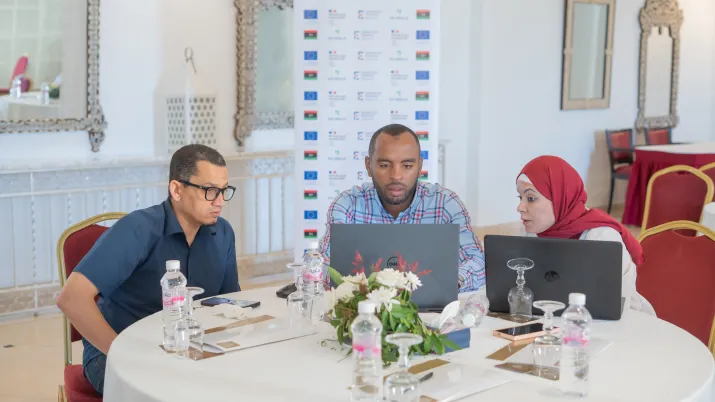Share the page
Strengthening women’s economic empowerment in African, Caribbean and Pacific countries: What role for business environment reforms?
Published on

To tackle the persisting barriers that prevent the full economic participation of women, in particular in African, Caribbean and Pacific countries, programmes such as the ICR Facility (Investment Climate Reform Facility) seek to promote inclusive and gender-responsive reforms.
During the ICR4WEE conference on 5 and 6 June 2024 in Kigali (Rwanda), experts and decision-makers shared their ideas and experiences on the importance of an equitable business environment, highlighting the positive impact that gender equality policies have on economic and social development.
Lors de la conférence ICR4WEE des 5 et 6 juin 2024 à Kigali (Rwanda), des experts et décideurs ont partagé leurs idées et expériences sur l'importance d'un environnement des affaires équitable, soulignant l'impact positif des politiques favorisant l'égalité des sexes pour le développement économique et social.
According to the United Nations, 178 countries maintain barriers that prevent the full economic participation of women, and nearly 2.4 billion women around the world do not have the same economic rights as men.[1] Throughout the world, women continue to face barriers that prevent their full and equal participation in economic life. This not only adversely affects their individual potential, but also the prosperity and development of entire communities and nations. Women are still widely under-represented in decision-making processes. They are also faced with structural legal and social gaps in relation to labour market participation, wages, access to financing, as well as access to formal and informal professional networks.
It is therefore imperative to tackle these barriers and thus create an enabling environment for women’s economic empowerment. It is essential to adopt gender-responsive business environment reforms to support this process, without overlooking everyone’s specific experiences and needs.
Team Europe committed to gender mainstreaming in business environment reforms
Through initiatives such as the ICR Facility (Investment Climate Reform Facility), which operates in member countries of the Organisation of African, Caribbean and Pacific States (OACPS), Expertise France promotes dialogue and helps public entities and the private sector jointly develop more gender-responsive regulatory frameworks, together with innovative public policies that contribute to addressing the many challenges facing women in the private sector.
Since 2020, the ICR Facility has implemented more than 77 operations in 68 countries, helping to build a more favourable business environment for entrepreneurs and business leaders. For example, the ICR Facility has assisted the ECCAS Commission with the creation of the High Business Council in Central Africa, the National Investment Promotion Agency of Comoros with the preparation of a White Paper on the Investment Climate of Comoros, and the Directorate-General for Public-Private Partnerships (PPPs) of the Ministry of Economy and Finance of Djibouti with the operationalisation of Djibouti’s PPP Framework. This initiative is in keeping with the Team Europe spirit: a multi-donor programme (co-financed by the European Union, the Organisation of African, Caribbean and Pacific States, the German Federal Ministry for Economic Cooperation and Development (BMZ), and the British Council), implemented jointly by several agencies of European Union Member States, including GIZ, Expertise France and SNV, along with the British Council.
ICR4WEE conference: dialogue, feedback and avenues for action
Building on these successes and the dynamic networks it has developed through its activities, the ICR Facility wished to bring together key actors in women’s economic empowerment from ACP countries.
150 participants from public and private institutions gathered on 5 and 6 June in Kigali, in Rwanda, to share their achievements and their innovative ideas on how business environment reforms can better include women and promote their economic participation.
The participants were able to take part in a wide range of panel discussions on various subjects, including the care economy, the use of gender-disaggregated data, and gender mainstreaming in public finances. These panel discussions were an opportunity for the participants to meet each other and benefit from a space for dialogue with their peers. The discussions contributed to identifying concrete solutions on how to create legal, institutional and regulatory conditions for the full participation of women in the economy.
Promote women’s participation in business: reflection and dialogue with organisations representative of the private sector
During one of the round tables, representatives of organisations representing the private sector highlighted the essential role of these structures in promoting the participation of women in business. Catherine Harris Karmo, Secretary General of the Liberian Chamber of Commerce, emphasised the capacity of each organisation to implement concrete measures, regardless of its level of expertise in gender issues. ‘We need to start small and build a momentum for change to improve the representation of women in chambers of commerce’, she explained.
For her part, Virginie Lauret, Executive Director of Cap Business Océan Indien, an organisation bringing together chambers of commerce and industry and professional organisations from the six island territories of the south-west Indian Ocean, stressed the importance of mobilising dedicated technical resources to support these changes: ‘We are lucky to have a gender equality officer on our team [...] and it works better with an internal resource.
Thanks to these exchanges, the participants were able to benefit from a wide range of testimonials and concrete solutions to be implemented to improve the participation of women in organisations representing the private sector as well as in the managerial structures of companies.
Last publications
Vietnam: The Team Europe mobilized to support innovation in the private sector
Published on February 25, 2026
Fighting Online Scams: How the EU ESIWA+ Project Strengthens Cyber Cooperation with the Indo-Pacific
Published on February 12, 2026



